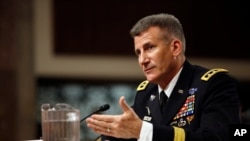The United States military for the first time has categorically stated its counterterrorism operations in Afghanistan are not targeting the Haqqani network of militants, which is fighting alongside the Taliban.
The comment this week by Lieutenant General John “Mick” Nicholson, picked to lead US and NATO forces in Afghanistan, has come as a surprise to regional analysts who say it could be signaling a shift in Washington’s policy to promote Afghan peace and reconciliation efforts.
“They are not part of that designation right now…The Haqqanis are principally a focus of the Afghan security forces,” Nicholson told the Senate Armed Services Committee on Thursday when asked wether U.S. forces target the Haqqanis as part of their counterterrorism mission in Afghanistan.
Nicholson went on to explain that the focus of U.S. counterterrorism actions are militants linked to al-Qaida and Islamic State group to prevent them from becoming a threat to the United States. Around 10,000 U.S. forces are stationed in Afghanistan as part of NATO-led Resolute Support mission to train and advise Afghan security forces and conduct counterterrorism operations.
But he reiterated the Haqqani network is “the number one threat” to American forces in the country and a “severe threat” to the Afghan government.
U.S. and Afghan officials have long alleged that Haqqanis together with the Taliban are using their bases in Pakistani border territory for attacks inside Afghanistan.
Nicholson reiterated those concerns in his testimony, saying the United States has not been satisfied that Pakistan has put enough pressure on the Haqqanis to prevent cross-border attacks.
“I view it as a serious problem and this has been one of the principal challenges. It is a sanctuary that our enemies and particularly the Haqqani network have enjoyed inside Pakistan,” he said.
The head of Islamabad-based Institute of Strategic Studies, Masood Khan, while commenting on the U.S. general’s comments regarding the Haqqani network says principal interlocutors need to “signal flexibility.”
Afghan, Pakistani, U.S. and Chinese officials have recently initiated a four-way peace process aimed at resurrecting stated talks between the Kabul government and the Taliban.
The contract group has held two meetings this month while a third is scheduled for February 6 in Islamabad.
“It is absolutely imperative to bring Afghan Taliban to the negotiating table. Pakistan believes that the best way to do this is through well-considered incentivization and inducement. Neither coercion nor weak blandishments would work,” said Khan.
Nicholson praised the quadrilateral talks as “a great leap forward”, saying it should result in a road map for further Afghan peace talks.
“These talks are encouraging; I see reconciliation as the path towards a negotiated settlement that brings about the end of conflict in Afghanistan.”
The Haqqani network has carried out some of the most sophisticated guerrilla attacks and suicide bombings in Afghanistan against both local as well as foreign targets.
Lately, it has focused its raids on targets in Kabul. The group's leadership U.S. officials believe has links to the Pakistani spy agency, charges Islamabad denies.




